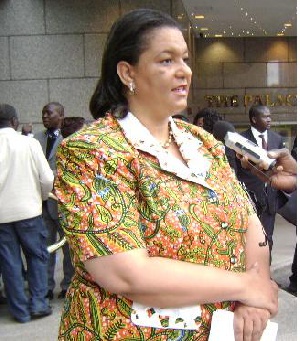The Ghana government is likely to tell ECOWAS of its plans to go solo on the signing of the Interim Economic Partnership Agreement (IEPA) when Trade Ministers in the sub-region meet in the country later this month.
The Trade and Industries Minster, Hannah Tetteh, told the media on Tuesday that the country would have preferred to join other member-countries within ECOWAS to sign the IEPA as a body; however, negotiations on the trade agreement with the European Union has stalled - pushing government to consider its options.
“For the past three years since I have been in this position as Minister, we haven’t really gone far with the ECOWAS EPA. The issues that we were discussing at the time I became Trade Minister are the same issues we are still discussing today within the framework of ECOWAS.
“So, we are not getting the consensus that would allow us to conclude an agreement at the regional level. And so we will have to take a decision very soon as to what will be the best way forward.
I don’t want to preempt that decision yet because we will be hosting at the end of this month the ECOWAS Trade Ministers meeting here in Accra, and these are some of the issues that are going to be on the table for discussion.
“So for me to say we are going to do this or that would essentially be preempting any decision that we may take as a result of that engagement. But by the end of this month, we will be clearer on the options that we have, which we will take a position on one way or another as to how to proceed on the IEPA,” she said.
The EPAs basically cover a set of agreements on reciprocal market access between the EU and countries in Africa, Caribbean and the Pacific (ACP) in place of the preferential regime under the Cotonou Agreement which allowed the countries tariff and duty free exports to the EU.
In late 2007, Ghana became the second African country after Cote D’ Ivoire to initial an IEPA, to allow the country continued access to the European market while it negotiated on finalising the signing of the agreement.
Initialising the IEPA also ended uncertainty and protected exporters who depend almost exclusively on the EU market, as their products would have attracted additional tariffs upon expiration of the non-reciprocal trade regime.
However, the reprieve will elapse in January 2014 -- after which the country will cease to have access to the EU market until it signs the IEPA.
“The reason why we have to take a decision on signing the IEPA is that the European Commission has made a proposal to the European Parliament to halt ACP countries’ access to the EU market by January 2014.
“By that time any country which has not ratified the EPA will no longer be eligible for market access -- and so the timeframe with which to come to a conclusion on the IEPA is defined for us,” added Ms. Tetteh.
Meanwhile, civil society organisations including the Third World Network (TWN) have urged government to forgo the IEPA in order to secure regional integration in the West-Africa sub-region.
The Head of Economic Unit of TWN, Gyekye Tanoh, recently argued that the country’s continuous use of IEPA is a threat to re-positioning the national economy and to regional integration in the Economic Community of West African States bloc.
“Today, more than 90 percent of Ghana’s most dynamic manufacturing exports go to the West Africa sub-region. As we have already discussed, the EPAs directly undermine this,” he said.
Business News of Wednesday, 2 November 2011
Source: BFT

















